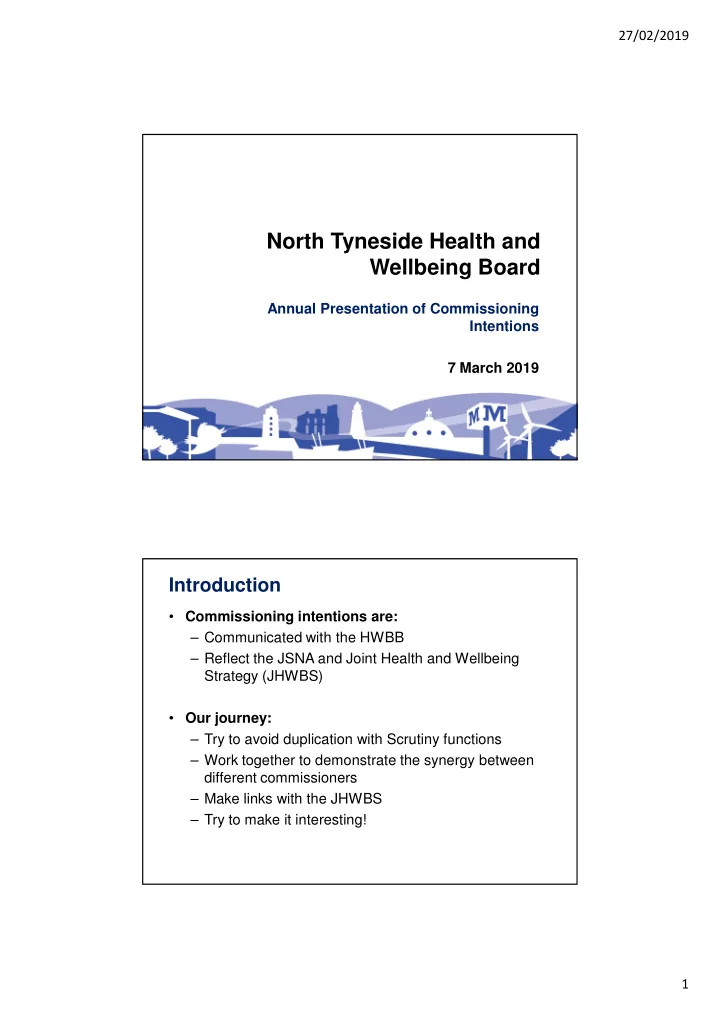

27/02/2019 North Tyneside Health and Wellbeing Board Annual Presentation of Commissioning Intentions 7 March 2019 Introduction • Commissioning intentions are: – Communicated with the HWBB – Reflect the JSNA and Joint Health and Wellbeing Strategy (JHWBS) • Our journey: – Try to avoid duplication with Scrutiny functions – Work together to demonstrate the synergy between different commissioners – Make links with the JHWBS – Try to make it interesting! 1
27/02/2019 JSNA - November 2018 JHWBS – a reminder • To focus on outcomes for the population in terms of measurable improvements in health and wellbeing • To reduce the difference in life expectancy and healthy life expectancy between the most affluent and most deprived areas of the borough • To shift investment to focus on evidence based prevention and early intervention wherever possible • To engage with and listen to local communities on a regular basis to ensure that their needs are considered and wherever possible addressed • To build resilience in local services and communities through a whole system approach across statutory and non-statutory interventions, to deliver better outcomes for the public and better use of public money 2
27/02/2019 How this fits together • Population JSNA level needs assessment • 5 strategic goals of how JHWBS we are responding to JSNA • Priority objectives Shared that cannot HWBB Work Strategic Plans be delivered Plan / Partnerships by a single organisation • How each organisation Commissioning will design Intentions and deliver services On the horizon • NHS long term plan: • Expanded community teams for support at home • Mental health • Same day emergency care • Mental health funding boost • ICS and ICP • Adult social care Green Paper: • Long term funding solutions • Possibly 2020 • Combined Authority: • Health and social care not currently in scope • Local System Reviews 3
27/02/2019 Early years • Reduce prevalence of smoking in pregnancy • Improve breastfeeding initiation and rates at 6-8 weeks: • Stage 3 Unicef accreditation in place for 0-19 service but needs to be achieved by NHCFT • Roll out training for perinatal mental health and improve pathways • Early identification of preschool children with SEND • Maximise the uptake of the 2 year targeted child care offer Children and young people • Improve mental health of young people • Understand gaps in provision through strategic alliance with Barnardo’s • Implement findings of health and wellbeing survey in schools and MH:2K project • Undertake and implement findings from CAHMS review • Continue to fund Kooth.com • Make application for wave 2 of national mental health trailblazer • Improve support to children and families affected by drugs and alcohol • Implement the PHE funded ‘Bottled Up’ project for children of alcohol dependent parents 4
27/02/2019 Children and young people • New drug & alcohol support pathway for young people • Consultation for PHE national childhood obesity trailblazer and act upon findings • Special Educational Needs and Disability (SEND) • Increase special school places • Joint commissioning with health • Co-production of proposals with parents • Commission a new framework for providers of independent foster care • Implement a new edge of care service for families with children either in or at risk of entering care Working age adults • Focus on prevention: • Reduce smoking prevalence by tackling nicotine dependence across the local system • Promote healthy weight / weight management support • Embed the newly procured all age specialist drug and alcohol service and improve treatment outcomes • Review suicide prevention action plan • Health needs assessment of long term conditions • Real time surveillance & response to drug related deaths and suicide • Improve outcomes for people with mental health, learning disability and developmental disorders • Improve prevention, early detection, treatment pathways and patient experience for cancer • Develop primary care and other services for integrated care on a locality basis 5
27/02/2019 Older people • Improve the identification and support of carers’ health and wellbeing needs • Integrate services, where appropriate, to improve care and quality and access to services • Strengthen services to reduce the impact of frailty on people’s lives and to prevent falls • Provide joined up care to residents in care homes via in-reach services • Maximise the opportunities afforded by assistive technology to better support people in their own homes • Continue to develop alternative housing options to support people to continue to live independently What residents are telling Healthwatch • General practice and primary care – access • Urgent and Emergency care • Role of services • Waiting times & appointments • Getting there • NHS 111 – role & quality • Mental Health • Young People • Older people • Working age • Cancer – waiting times and ongoing support • Social care • Access • Care homes • Care at home – gap in feedback 6
27/02/2019 • Thoughts • Questions • Comments 7
Recommend
More recommend